#Investment Opportunities in Abu Dhabi
Explore tagged Tumblr posts
Text
Venture Capital Insights for Abu Dhabi Startups
Venture capital (VC) is a transformative force behind the success of startups worldwide, and Abu Dhabi is no exception. With its startup-friendly policies, innovative business environment, and growing opportunities, the UAE’s capital city has become a hotspot for venture capital investment.

Are you wondering how venture capital can fuel the growth of startups in Abu Dhabi? This blog delves into the essential aspects of venture capital in Abu Dhabi—its role, funding processes, and how startups can secure investments. Let’s explore!
The Role of Venture Capital in Abu Dhabi’s Startup Ecosystem
Abu Dhabi’s burgeoning startup ecosystem owes much of its rapid growth to venture capital firms. These firms provide more than just financial backing; they contribute expertise, mentorship, and strategic support to innovative businesses. Below are the three key roles that venture capital firms play in Abu Dhabi:
1. Fueling Innovation with Financial Support
Startups require substantial funding for research, development, marketing, and scaling operations. Venture capital firms in Abu Dhabi focus on providing growth-stage startups with the financial resources they need. However, early-stage ventures with strong potential also attract VC attention. By offering capital, venture capitalists enable startups to achieve operational milestones and enter new markets.
2. Offering Industry Expertise and Mentorship
Every startup faces challenges, from market entry to scaling operations. Venture capital firms in Abu Dhabi assign industry experts to mentor entrepreneurs. These experts share invaluable insights, industry connections, and guidance to help startups overcome obstacles and grow sustainably.
3. Supporting Strategic Decision-Making
For startups, every decision—from product development to scaling—is critical. Venture capital firms provide hands-on support in evaluating risks, planning strategies, and making informed decisions. This collaboration empowers entrepreneurs to focus on their core business goals.
Understanding the Venture Capital Funding Process in Abu Dhabi
Securing venture capital funding in Abu Dhabi involves multiple stages. Here is an overview of the typical VC funding process:
Step 1: Pitching to Venture Capital Firms
The process begins with creating a compelling pitch. Entrepreneurs present their startups to VC firms, showcasing their business model, market research, financial projections, and traction (if applicable). A clear and engaging pitch is essential to capture the interest of investors.
Step 2: Initial Screening
VC firms in Abu Dhabi screen numerous startups to identify the most promising investment opportunities. During this phase, they assess the startup’s market potential, scalability, team expertise, and product innovation. Startups with well-prepared pitches and strong business cases stand a better chance of advancing.
Step 3: Due Diligence
Once a startup passes the initial screening, it enters the due diligence phase. This involves thorough evaluation of the startup’s financial records, legal compliance, and operational framework. VCs also review the qualifications of founders and key team members. Due diligence builds trust and ensures transparency.
Step 4: Negotiating Investment Terms
After successful due diligence, the next step is to negotiate investment terms. This includes funding amounts, equity stakes, board representation, and potential exit strategies. Both parties work to align their goals and finalize the terms of the agreement.
Step 5: Finalization and Post-Investment Support
Once the terms are agreed upon, a legal contract is drafted. Post-investment, venture capital firms often remain actively involved in the startup’s journey. They offer strategic guidance, operational expertise, and connections to accelerate growth and prepare the startup for future funding rounds.
Tips to Secure Venture Capital in Abu Dhabi
Understanding the funding process is crucial, but preparing strategically can further improve your chances of success. Here’s how you can attract venture capital in Abu Dhabi:
1. Identify the Right Venture Capital Firms
Not all VC firms are suitable for your startup. Each firm has a specific focus, whether it’s technology, healthcare, fintech, or sustainability. Research and identify firms that align with your industry and vision. Building relationships through events like the International Investor Summit can also help connect with the right investors.
2. Craft a Data-Driven Pitch
Your pitch should clearly articulate your value proposition, market research, financial projections, and team’s expertise. Highlight how your innovative idea addresses real-world challenges. A well-prepared, data-driven pitch increases credibility and investor confidence.
3. Emphasize Market Potential and Scalability
Venture capitalists seek startups with high-growth potential and scalable business models. Showcase your understanding of the market and demonstrate how your startup can capture a significant share of it.
4. Build a Strong Team
Investors often prioritize the team’s experience and expertise over the product itself. Assemble a dedicated team with complementary skills and a shared vision. Highlight the team’s ability to execute your business strategy effectively.
5. Network and Build Relationships
Networking plays a pivotal role in securing venture capital. Attend key events, pitch competitions, and industry conferences to build connections with potential investors. Establishing trust and rapport with VCs can significantly impact their investment decisions.
Conclusion
Venture capital is a vital catalyst for startups looking to grow in Abu Dhabi’s competitive ecosystem. With access to funding, mentorship, and strategic support, startups can overcome challenges and unlock new opportunities. By understanding the VC funding process and preparing strategically, you can position your startup for success.
Networking at platforms like the International Investor Summit in Abu Dhabi can further enhance your chances of securing funding. As a hub of innovation and investment, Abu Dhabi continues to attract global investors and ambitious entrepreneurs, making it an ideal destination for venture capital activity.
FAQs
1. How can I find venture capital firms in Abu Dhabi? You can discover venture capital firms through government directories, startup accelerators, and networking events like the International Investor Summit. These platforms provide direct access to investors.
2. Which sectors are venture capitalists in Abu Dhabi focusing on? Key sectors attracting venture capital include technology, healthcare, fintech, and renewable energy. These industries align with Abu Dhabi’s economic diversification goals and offer significant growth potential.
3. What do VCs look for in startups? Venture capitalists evaluate the team’s expertise, innovative business models, market scalability, and financial viability. A strong pitch supported by data and market research is essential to stand out.
0 notes
Text
Top Business Ideas in the UAE for Entrepreneurs
Starting a business in UAE is an exciting venture, as the country offers numerous opportunities across various sectors. The UAE is home to some of the most lucrative industries in the world, whether you're an experienced professional looking for new growth opportunities or an aspiring entrepreneur searching for the ideal niche. There is a lot of potential to tap into, including in the areas of real estate, e-commerce, tourism, healthcare, and IT. We'll look at the best business concepts in this blog to help you start a profitable company in the United Arab Emirates.
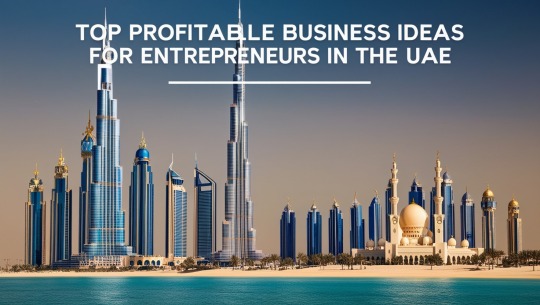
Why Entrepreneurs Find Success in the United Arab Emirates
In addition to being a prime location for companies, the UAE provides an environment that encourages development and creativity. It is a desirable location for entrepreneurs due to its tax-free zones, sophisticated infrastructure, and business-friendly laws. Whether you're looking to launch a local business or expand your global reach, the UAE is the place to be. However, which industries are the most lucrative and appropriate for would-be business owners?
Profitable Sectors for Starting a Business in the UAE
1. Real Estate
One of the most profitable industries in the UAE is real estate, and international investors are drawn to Dubai and Abu Dhabi on a regular basis. The nation is the perfect place for real estate services and property investment because of its expanding population, influx of tourists, and creation of famous landmarks.
Innovative Business Ideas in Real Estate:
Property Management Services: Providing property management services can be a profitable choice in an ever-growing market.
Real estate brokerage: Helping foreign customers purchase or rent real estate can generate a consistent income in this cutthroat industry.
Flexible office spaces are becoming more and more in demand as the entrepreneurial culture expands.
2. E-Commerce
Due to the widespread use of smartphones and the growing number of tech-savvy people, the e-commerce sector has grown rapidly in recent years. Starting a business in UAE’s e-commerce market can be an excellent choice, especially as the country embraces digital transformation.
Innovative Business Ideas in E-Commerce:
Online Retail Store: Selling specialized goods, such as electronics or clothing, can give you a firm footing in this cutthroat market.
Marketplace Platforms: In order to take advantage of the UAE's booming retail industry, establish a platform for local vendors to sell goods online.
Subscription Boxes: Provide specialized subscription boxes for niche markets, such as gourmet foods, wellness, or cosmetics.
3. Tourism
With millions of tourists visiting the UAE each year, tourism plays a major role in the economy of the nation. There are plenty of options for entrepreneurs with sights like the Palm Jumeirah, the Burj Khalifa, and the desert safari experiences.
Innovative Business Ideas in Tourism:
Luxury Travel Services: Provide wealthy people with unique and personalized travel packages.
Services for Tour Operators: Focus on speciality tours, like eco-tourism, adventure, or cultural experiences.
Travel Technology Solutions: Offer cutting-edge platforms or applications for travel that improve visitors' experiences.
4. Healthcare
The UAE's healthcare industry is expanding quickly, with an emphasis on offering both locals and visitors top-notch medical care. The government's drive for top-notch medical facilities and health technology innovation can help entrepreneurs in the healthcare sector.
Innovative Business Ideas in Healthcare:
Offering online medical consultations and healthcare services, telemedicine has become more and more popular in the post-pandemic world.
Fitness and Wellness: Open a yoga studio, fitness center, or wellness app to appeal to the health-conscious population in the United Arab Emirates.
Medical Equipment Supply: Provide medical devices and equipment to clinics, hospitals, or home care agencies.
5. IT and Technology
Fintech, AI, blockchain, and cybersecurity are among the rapidly growing tech-driven industries in the United Arab Emirates.. Starting a business in UAE in the IT sector is a smart move, as the government is heavily investing in technological infrastructure.
Innovative Business Ideas in IT:
AI Solutions: Create AI-driven solutions for companies in a range of industries, including retail, healthcare, and real estate.
Cybersecurity Services: Provide cybersecurity services to companies that want to safeguard their systems and data in a world that is digitizing quickly.
Blockchain Solutions: Develop blockchain-based software for logistics, finance, or supply chain management.
How to Enter These Markets
Understanding the local market, adhering to legal and regulatory requirements, and making the appropriate technological and infrastructure investments are all crucial for capitalizing on these lucrative industries. Starting a business in UAE requires careful planning, market research, and a solid business strategy. Operating in one of the numerous free zones can provide substantial tax benefits and streamlined business setup procedures for foreign business owners.
Start Your Business in the United Arab Emirates
Are you prepared to begin your business endeavors in the United Arab Emirates? The UAE provides business owners with a multitude of options, regardless of their interests in IT, e-commerce, real estate, or healthcare. Working with a reputable business setup company that can help you navigate local regulations and guide you through the process is essential to turning your vision into a reality.
Starting a business in UAE has never been easier. Establishing a successful business in one of the most dynamic and business-friendly environments in the world is possible with the correct business idea, strategy, and support.
#StartingABusinessInUAE#UAEEntrepreneurs#BusinessIdeasUAE#UAEStartups#EntrepreneurshipInUAE#UAEOpportunities#ProfitableBusinessesUAE#DubaiBusinessIdeas#BusinessSetupUAE#EntrepreneurialSuccess
3 notes
·
View notes
Text
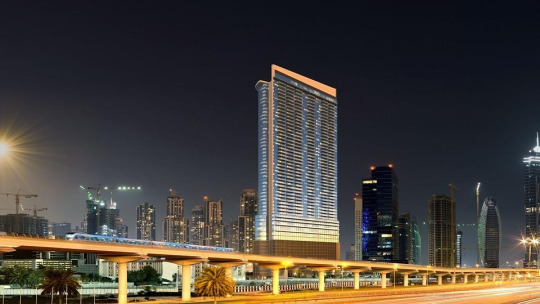
Have you ever pondered about investing in the ever-buzzing UAE real estate market 🌇? Well, things are heating up, and the upcoming opportunities are more transparent and promising than ever.🆙 Check out this comprehensive guide: https://www.summerhomes.com/en/property-in-uae 🏠.
From awe-inspiring skyscrapers in Dubai to cozy townhouses in Abu Dhabi, the UAE real estate market has a myriad of options wrapped in modernity and cultural heritage. 🌐 Not only is it offering attractive financing and flexible payment options 💸, but it's also showing a great recovery boost, post-pandemic. 📈
This is fuelling an impressive growth in the luxury segment and paving the way for more sustainable and tech-integrated property designs. 🍃💻 Investors, it's high time to consider this hot market enriched with property types to match any budget and design preference! 🏦
Embrace the future of real estate with #UAEProperty #RealEstateInvestments #SustainableLiving #SmartHomes and step into a world of promising returns and unmatched luxury. Take the leap, and let's create your success story in UAE real estate together. 🚀🌟⭐
2 notes
·
View notes
Text






6 October 2024: King Abdullah II and United Arab Emirates President Sheikh Mohamed bin Zayed Al Nahyan held talks that covered the deep-rooted ties between the two countries, as well as regional developments.
During the talks, attended by Crown Prince Hussein, the two leaders affirmed the depth of Jordanian-Emirati relations, as well as keenness to consolidate them to serve mutual interests, and strengthen joint Arab action.
His Majesty and the UAE president witnessed the signing of the Comprehensive Economic Partnership Agreement between the two governments, which aims to enhance economic, trade, and investment relations, create jobs, improve supply chains, and accelerate the growth of priority sectors.
The two leaders stressed the importance of the agreement, which is the result of fruitful economic relations as it provides a broad base of opportunities for future development.
The King expressed hopes that the agreement would contribute to implementing the two countries' shared vision toward sustainable development and economic prosperity, and opening new horizons for economic integration, commending the UAE’s support for Jordan's development efforts.
For his part, Sheikh Mohamed welcomed the signing of the agreement, which is the UAE's first with an Arab country, citing the agreement as a natural development of the brotherly and strategic relations between the UAE and Jordan.
The two leaders also witnessed the signing of the Customs Cooperation and Mutual Administrative Assistance Agreement, signed by the two governments.
The talks also covered areas of bilateral cooperation in economy, investment, sustainable development, food security, and renewable energy, with both leaders expressing keenness to build strategic economic partnerships.
On regional developments, the two leaders stressed the need to step up Arab and international efforts to stop the war on Gaza and Lebanon, protect civilians, and de-escalate the situation in the region.
The two leaders reiterated their firm position in support of the unity, sovereignty, and security of Lebanon, and their support for the Lebanese people.
The talks also focused on ways to step up the humanitarian response to the catastrophe in Gaza.
His Majesty warned of the consequences of continued attacks by extremist Israeli settlers on Palestinians in the West Bank and violations of Muslim and Christian holy sites in Jerusalem.
The two leaders reaffirmed their full support for the Palestinians in achieving their legitimate rights, and working to find a political horizon to achieve just, comprehensive, and lasting peace, on the basis of the two-state solution.
Sheikh Mohamed praised Jordan's historic role in supporting the Palestinian people on various levels, voicing appreciation of the Kingdom's support for the humanitarian response in the Gaza Strip.
Prime Minister Jafar Hassan, Deputy Prime Minister and Foreign Minister Ayman Safadi, Director of the Office of His Majesty Alaa Batayneh, Minister of Industry, Trade, and Supply Yarub Qudah, General Intelligence Department Director Maj. Gen. Ahmad Husni, Jordan’s Ambassador to the UAE Nassar Habashneh, and a number of officials attended the talks.
From the Emirati side, Sheikh Hazza bin Zayed Al Nahyan, deputy ruler of Abu Dhabi; Sheikh Hamdan bin Mohamed bin Zayed Al Nahyan; Sheikh Mohammed bin Hamad bin Tahnoun Al Nahyan, adviser for special affairs at the Ministry of the Presidential Court; and a number of officials attended the talks.
The King and the Crown Prince bid farewell to Sheikh Mohamed bin Zayed Al Nahyan at Marka Airport, as he and his accompanying delegation concluded their visit to Jordan on Sunday evening.
2 notes
·
View notes
Text
Good afternoon TUMBLR - April 21th - 2024
''Mr. Plant has owed me a shoe since July 5, 1971."
Mohammedia, Morocco – 2002
It was beginning of June and I got a call from Rome: the kind Mrs. Sette - HR Representative of TECHNIP Italy - asks me if I am interested to on mission to Mohammedia, Morocco. Of course I am! Was my answer. A week later, I am summoned inside the mega headquarters of Technip Italia, in Rome, to carry out the medical examinations and sign the employment contract. At the time I had just bought a new car, an Alfa Romeo 147, so we organized a trip to Rome with my family. It was a pleasant trip and stay, and we had the opportunity to visit Sperlonga and Gaeta.
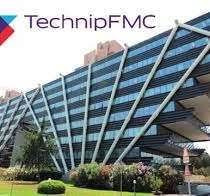
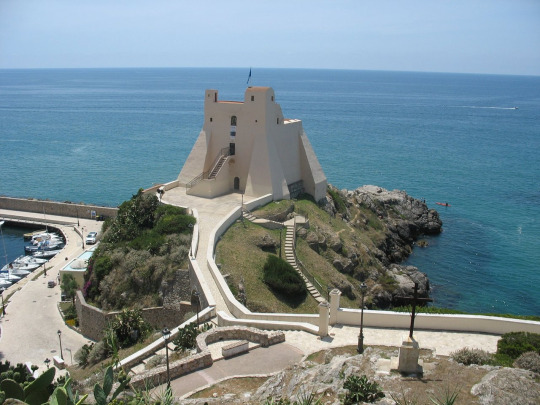
Sperlonga.

Gaeta.
I left for Casablanca at beginning of July, returning to work in Morocco after 11 years. I arrived at Mohammed V airport and with the ''excuse'' that Technip was aware of my past in Morocco, no one was there to welcome me. A Grand taxi took me to the Hotel Sabah as was previsiosly agreed - I would stay there for a few days, until I'll find a suitable accommodation. In the late afternoon I was joined by the Mission's Head, Mr. De Sanctis, a Roman guy, an elderly person with some walking problems. At dinner he explained to me that the team would be made up of a total of 4 people: a civil supervisor, a mechanic, and an electro-instrumental supervisor
THE PROJECT. The SAMIR refinery in Mohammedia, about 20 km north of Casablanca, was built by Italian Snamprogetti/SAIPEM in the '70s. The property had more recently been acquired by a Joint Venture between a Swedish Investment Fund and a wealthy Saudi investor. The new ownership had decided to modernize the complex, building new production plants next to the existing refinery. For this purpose, TECHNIP was contacted to follow up the partial demolition of the existing plants and part of the Tank Farm, and prepare the areas where the new plants would be built. Our mission was to supervise the demolitions of the tanks, and the preparation of the areas with selected materials capable of withstanding the considerable loads of the new installations. SAMIR had not yet appointed the Main Contractor of the new plants - a contract worth 316 million dollars - TECHNIP Italia had agreed to follow the preparatory works to try to ''get a foot in'' the refinery and undermine others competitors.
MISSION TASK FORCE. In addition to the aforementioned Mr. De Santis, the following people were part of the mission: Mr. Rinaldo Cozzi: originally from Cerro Maggiore (North of Italy). He was our electro-instrumental expert. A decent person, even if a little closed off. He only went out with us during the visits of the Technip manager Ing. Petrillo. I will meet Cozzi again in Shah – Abu Dhabi, where he had a position with SAIPEM pipeline. Mr. Mario Maggi, from Piacenza - a jovial and open guy, he was coming from a previous experience in Senegal. Expert in turbines, compressors etc, in truth he didn't have much to do since we were only talking about demolitions.
LIFE IN MOHAMMEDIA. Mohammedia is the seaside city of Casablanca. Equipped with somewhat old hotels, it is made up of residential areas of holiday villas built in the early 1980s. The city has therefore become a destination for medium-low level tourism, also following the construction of the refinery and the Power Plant overlooking the Atlantic Ocean.
LOGISTIC. After an initial period in which I slept in hotel, I found a decent oceanfront apartment through a real estate agency. Inserted in a beautiful park, the apartment was on the first floor of a holiday condominium. The local owner was living abroad, and had entrusted the agency with the task of managing the rent from the apartment. I really enjoyed it, and I stayed in the same apartment for the entire ten months of my stay in Mohammedia.
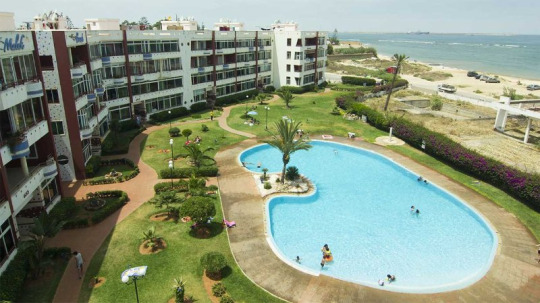
Mr. De Sanctis lived in a villa on the Plage Manesmane.
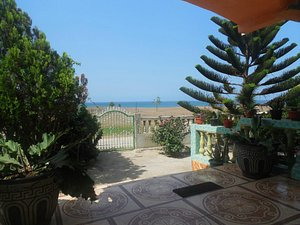
Mr. Cozzi in another house near De Sactis, while Maggi had chosen to stay secluded in a villa further inside the city.
SUB-CONTRACTOR The Contractor that would carry out the work was chosen directly by the Technical Management of the refinery. Mr. Berrada, the Site Manager was a competent and approachable young engineer. The history of this Company is intertwined in a curious and surprising way with the attack that King Hassan II suffered on 16 August 1972, when the Royal Boeing 727, returning from an official trip to France, was attacked by military jets of the Force Armee Royale. According to the reconstruction of the event, the plane was hit on one of the engines, but the pilot managed to make escape the jet unscathed, and thus saving the life of the Sovereign. That pilot's brother was the owner of a small building Contractor from Casablanca. The pilot's exploits made the fortune of his brother, who in a short time became one of the largest entrepreneurs in the construction sector in Morocco, going so far as to build the so-called ''Twin Towers'' of Casablanca, which with their height of 128 meters are have long been the tallest skyscrapers in Morocco.
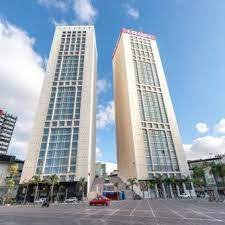
WORK PROGRESS. The rafinery plot was overlooking the Atlantic Ocean. The progress of the works was quite regular, the demolition of old tanks continued apace and so did the creation of new areas for the new plants. To the South of the plant, divided only by a reception wall, stood the coal power plant built in the 1980s by the Italian Cimi Montubi Group.
FLOOD DISASTER - NOVEMBER 2002. Everything went well until the beginning of November. Yes, it's true, sometimes we had some problems getting the refinery operators out of their offices before proceeding with their demolition. But it had been raining cats and dogs for three days, even though they told me it was the season. On a Saturday morning the SAMIR management received a call from a dam Director, located approximately 45 km away from the plant. The Director warned that since the water inside the artificial reservoir of Barrage Oued El Maleh had now reached the overflow point, it had been decided to open the gates of the dam, and let part of the water flow into the Oued El Maleh , whose course, after reaching the refinery, flowed into the Atlantic between the refinery itself and the Royal Golf Club. The Dam Director estimated that the flood wave would reach the refinery towards the late afternoon of the same day. As a precaution, operations at the plant should have been stopped. A consultation with Saudi ownership categorically ruled out shut down onthe entire complex. The costs of shut down, lost production, and start-up were the reasons given for refusing to stop operations. Never was a decision more wrong.
At 3.00 PM order had been given to leave the plant. The water from the Ouadi El Maleh had already overcome the barrier set up at the entrance to the plant, and was spreading throughout the area. The area of our offices, lower than the rest of the refinery, was already heavily flooded. We returned to Mohammedia with in mind the worried faces of the operators who were preparing to spend the night in the plant. It was around 9.45 in the evening when the first explosions were heard. I went out onto the apartment balcony and looked towards the South: I could see some flashes that lit up the dark night. Firefighter and Red Crescent sirens. And then an explosion louder than all the others: we then learned that a diesel tank had been blown up. We would find the roof of the tank thrown like a giant frisbee 150 meters away. The fire had attacked the power station, and triggered the explosion when the water reached the high voltage bars. Most of the utilities were destroyed that night. Thanks to the work of firefighters who also came from Casablanca, and of the refinery operators, the fire was contained and did not reach the fuel depot area where there were dozens of tanks full of oil and diesel: it would have been a Biblical disaster.
Two operators lost their lives in the accident, and numerous were injured. When the refinery was made safe, the highest authorities in Morocco came to visit, first and foremost King Mohammed VI. The refinery management asked us to participate in the damage assessment, alongside a specially established insurance team. At the end of the survey, which lasted weeks, the damages were estimated at 157 million dollars. During the cleaning operations from the mud that had invaded the entire area of the plant, many teams of volunteers showed up after King Mohamed VI's appeal on TV. What remained was the regret of a disaster caused once again by a decision dictated by mere selfishness. The questions I asked myself at the time was: ''In his country, would the Saudi owner of the refinery have made the same decision, that is, not to stop the plant?''
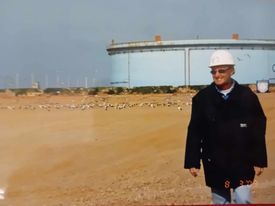


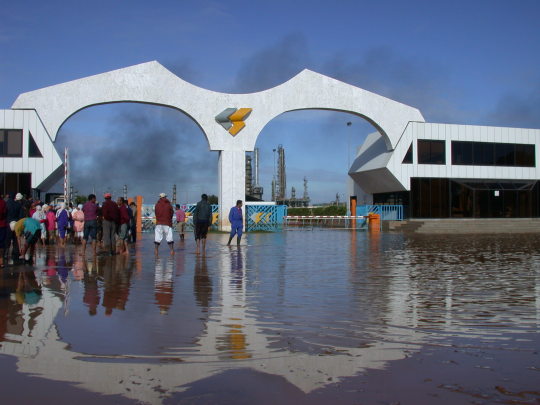
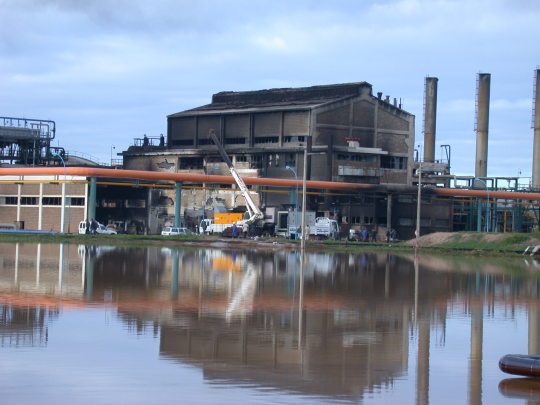




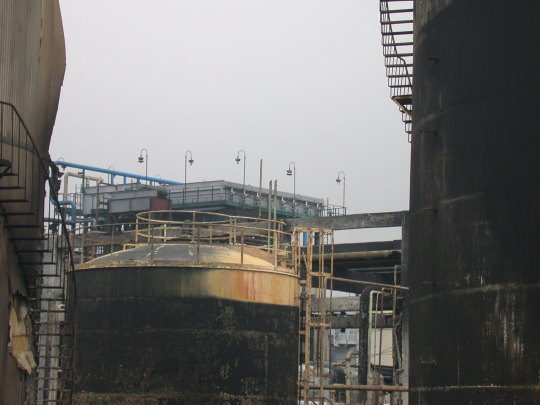
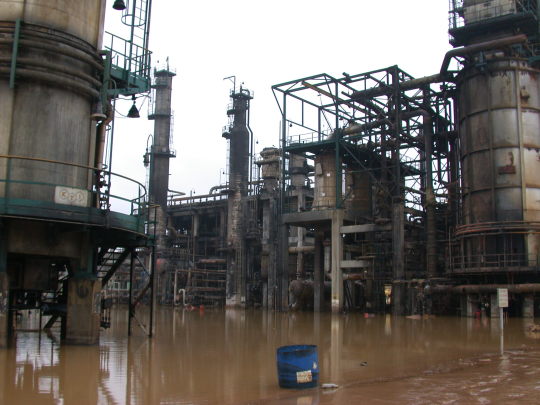

END OF MISSION. At the end of April, the enormous cleaning operation of the refinery had been completed, even if production had not been able to resume due to the enormous damage caused by the flood and the subsequent fire. Our work to prepare the areas was coming to an end, and the most disparate rumors were circulating about the name of the Main Contractor who would win the contract for the new installation. The sentiment was that they would not be awarded to TECHNIP Italia, regardless of our performance during the Early Works.
Italian Giant SAIPEM was awarded the project.
3 notes
·
View notes
Text
Unit 10: Finale
My personal ethics are a mix-bag due to living in multiple different cultures. I lived in Korea until 7. Then, I moved to the UAE and stayed there for 12 years. Now, I’ve been in Canada for the past 4 years. Throughout, some of the things I came to value are fairness, responsibility, and self-improvement. These ethics can translate, in multiple ways, to that of a natural interpreter.



Casual photos of places I've lived in: Korea (top left), Abu Dhabi (top right), Guelph (bottom).
The fairness ethic of mine developed by experiencing a variety of cultures and peoples in my life. In the UAE, I went to an affluent international highschool, where I met people from all over. However, outside school, the UAE is full of low-wage immigrant workers and it becomes evident that they are underserved in various aspects of life. The UAE essentially has no middle class as you see in Canada - it’s either poor or high-middle class (or higher). In Canada, I experienced the full force of the oftentimes struggling middle class. Many of my friends are white and considered “privileged”, yet they have to work so much just to afford the basics.
Thus, I feel a responsibility, as a natural interpreter, to bring fairness to all. A core aspect of being a good interpreter is to serve a diverse audience (Beck et al., 2019, pg.132), especially if your goal is to spread the message of an environmental issue. This also ties into the concept of “unpacking” my privilege so as to not bias your interpretation to a certain group of people (Gallavan, n.d.).

Image credits: Spirit FM
Barriers create the “underserved populations” and by recognizing this, I can expand my reach towards these parts of society (Beck et al., 2019, pg.132). For instance, economics may be a key barrier towards a large part of the population, especially if they do not possess a personal vehicle or are busy with work (Beck et al., 2019, pg.133). Or, there may be cultural barriers where different groups have very different opinions about nature (Beck et al., 2019, pg.133).
Whatever the barrier, by “unpacking my privilege” and following my fairness ethics, I have the responsibility to reach out to give a fair chance to everyone. For example, if I were to work in a national park, I could make the effort to reduce economic barriers by advocating for cheap transportation (like a bus) to pick up people and at diverse times to allow for busy people to have an opportunity.
Also, as a “minority” myself, I oppose the idea of treating them differently just because they are a “minority”. I think my experience in Guelph exemplified a good approach that ensures fairness. Here, I have never once been treated differently just because I am Asian. If anything, people treated me like a fellow Canadian, even asking me who I voted for during the 2019 election. As such, I think it is important to recognize it is wrong to generalize a minority group (Beck et al., 2019, pg.133) and when making the special effort to reach out to them, don’t make it seem like a special treatment type of deal (Beck et al., 2019, pg.134). If possible, the best approach would be to treat everyone equally while keeping in mind who your current audience is. This can be done by friendly talking to them, asking why they're here, and even internet surveys (Beck et al., 2019, pg.129).
When it comes to responsibility and the self-improvement ethic, this is heavily tied to my Korean heritage. In Korean culture, you are always compared to others, and people have very high expectations of you. Almost feels like you are constantly carrying the weight of the world. Thus, if I don’t get perfect on a thing I am invested in (like academia), I become angry at myself. I think this is a toxic trait of mine but the positives can be used as a natural interpreter.

Image credits: Presentermedia
Having a sense of responsibility allows you to try to perfect your interpretation of nature. While this may be subjective, a good interpretation takes considerable effort, which may be lacklustre without a sense of responsibility for the environment. It is not a walk in the park to make an emotional and intellectual connection with the audience, communicated through nature (Beck et al., 2019, pg.304).
For instance, the usage of arts can tremendously benefit the interpretation. I believe even approaches like theatre and reenactments can be useful for natural interpretation. Having a diversity of approaches that targets all the senses help leave an impression (Beck et al., 2019, pg.107). However, these approaches require heavy investment into knowledge, making connections to the character, props, rehearsals and much more (Beck et al., 2019, pg.219). Only someone with a high sense of responsibility for the environment and position can tackle such a challenge.
With self-improvement, it will help further improve as an interpreter. By taking good feedback and reflecting on your doings (and if it meets your objectives), you can infinitely improve (Beck et al., 2019, pg.419). I think one of the best things you can do to do this is to invite other natural interpreter sites and become a "visitor" for your own sites (Beck et al., 2019, pg.420). Oftentimes, you know more than the audience and thus may leave out key details that the audience may not know. By fixing these issues, it makes the interpretation much more available for all audiences.
Finally, I want to talk about an approach that is suitable for me and others in my generation. We grew up with the rapid development of technology. Many might think this causes a disconnect between people and nature (Beck et al., 2019, pg.166). However, I believe we can use it to also reconnect. Websites, social media, Youtube, etc. have the presence of billions. As such, I see our technology literacy as a huge opportunity to reach those billions of people to reconnect nature into humans (Beck et al., 2019, pg.168).

A foldable phone - a symbol of today's rapid technological development.
Overall, I have a long way to go to be an interpreter. However, I have still learnt much, especially in ways of scientific communication - a topic important in current science.
I hope people feel the same and good luck on the final stretch!
Eugene Cha
Beck, L., Cable, T. T., & Knudson, D. M. (2019). Interpreting cultural and natural heritage: For A Better World. Sagamore Publishing.
Gallavan, N. P. (n.d.). Helping teachers unpack their "invisible knapsacks". Multicultural Education, 13(Pages: 36-36).
32 notes
·
View notes
Note
What kind of company is KKR? Is it a good or bad thing that they bought S&S? (I see people freaking out about it)
People freak out about a lot of things. :-)
So if you read what I posted yesterday before the sale was announced, I said that in my (random) opinion, KKR was the best of the available options. Seems the powers that be like them and their 1.6 billion dollars in cash quite a bit, also, because shortly after that the sale was announced.
Things I know: S&S has been for sale for three years; it was gonna get sold to somebody. The sale to PRH already fell through. This time around, the options were a) HarperCollins/NewsCorp/Rupert Murdoch/Evil; b) an random investor backed by Abu Dhabi $$; c) KKR. a private equity company that has a lot of money and also publishing veterans on staff. They went with KKR.
Read more about it here -- in short, the sale will mean that S&S becomes a stand-alone private company, rather than part of an evil mega-corporation as it is now (and would have been again had Harper bought it). The president of S&S sounds happy. The company apparently is very invested in continuing and boosting S&S's successful legacy. The want to start an "equity ownership program to give the company's more than 1,600 employees the opportunity to participate in the benefits of ownership."
I dunno, those sound like good things to me, but I can't say that I'm a "private equity" expert (and in fact I don't even really know what most of those words mean -- like eque-what? Fund who? investmehuh?) I'm literally picturing Richard Gere in Pretty Woman explaining his job to Vivian after he decides to become nice -- that's who I think bought S&S. Am I close? I don't know lol.
So anywhoo, I guess we'll all find out in the fullness of time.
8 notes
·
View notes
Text
Why Market analysis is important in the modern day business setting?
The importance of market analysis is similar to the importance of research in prior to any huge investment. In simple language, market analysis is simply learning about the map before getting along with a treasure hunt. That said, it helps you understand the territory, recognize where the treasure (or opportunity) lies, and come up with the finest course of action to reach it while avoiding potential pitfalls.
On the other hand, for any new company, before getting market entry Saudi Arabia this "plan" can help in proper guidance and implementation of strategies. Moreover, this post will dive into why market analysis is crucial for the success of any new company and how you must go about it.
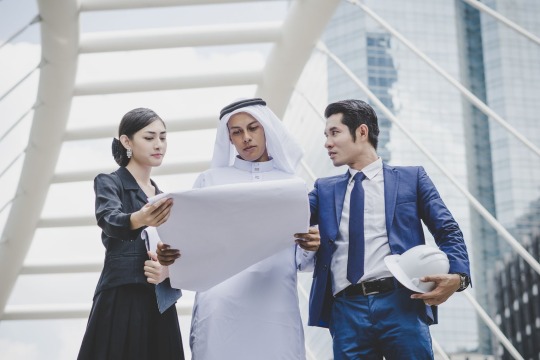
What is Market Analysis and how it can help?
Talking in layman’s terms, market analysis includes gathering and analyzing data around the industry you're entering, potential clients, and your competitors. It's around replying key questions: Is there a request for your product or service? Who are your clients? What are their needs and inclinations? Who are your competitors, and what can you offer that they can't? This understanding is foundational since it talks regarding each angle of your business strategy from product improvement to promoting, cost, and more.
On the other hand, market analysis helps you distinguish both opportunities and challenges inside your target domain. Moreover, it can uncover gaps within the market that your products or services can fill, making you appear where the "treasure" lies.
At the same time, it can also highlight potential challenges, such as strong competition or administrative obstacles, permitting you to plan techniques to overcome them. Also, without this investigation, you might miss profitable opportunities or run headlong into challenges that may have been dodged. Moreover, it is quite important if you are getting along with company formation in Abu Dhabi Global Market.
Customizing your services and products
Every customer of the modern era looks for personalized products and services. That said, one of the key benefits of market analysis is that it empowers you to tailor your products or services to the requirements and inclinations of your target customers. Also, by understanding what your potential customers are looking for, you can design your offerings to meet those needs better than your competitors. Moreover, this can be a critical differentiator during company formation in Dubai International Financial Center.
The importance of Strategic Decision Making
On the other hand, Market analysis informs strategic decision-making. Additionally, it provides the data and insights needed to make informed choices about where to allocate resources, which markets to enter, and how to position your company. For instance, if market analysis for market entry Saudi Arabia reveals a high demand for a particular service in an underserved region, a new company might decide to focus its efforts on that region. Without these insights, companies risk making decisions based on assumptions rather than facts, which can lead to costly mistakes.
Proper Risk Management is important
If you are an entrepreneur, you must know that starting a new company is inherently risky, but market analysis can help mitigate some of these risks. Also, by providing a clear picture of the market, it allows companies to make calculated risks rather than taking blind leaps of faith. For example, if analysis shows that a specific market segment is shrinking, a company might decide to focus its resources elsewhere. This way, you can thereby avoid potential losses during company formation in Abu Dhabi Global Market. In essence, market analysis acts as a risk management tool, helping new companies navigate uncertain waters more safely.
The significance of fund procurement
For new companies and new businesses looking for investment, an intensive market analysis is frequently a prerequisite. That said, Investors need to see that you got a profound understanding of the market you're entering, including the cost, client socioeconomics, and competitive scene. Moreover, a comprehensive, market analysis can make the difference between securing funding and being turned away. This is because it illustrates that you simply have done your homework and are making data-driven choices during company formation in Dubai International Financial Center.
Long-term planning is the key
At last, market investigation isn't just around the present but also regarding laying the foundation for long-term success. Moreover, it helps you set practical objectives and targets, plan for development, and expect future patterns and changes within the markets. Also, by routinely updating your marketing analysis, you'll stay ahead of the competition, adjusting your procedures to meet modern day market needs.
Final words
Hence, we can say that market analysis is an irreplaceable tool for the success of any new company. Moreover, it will offer detailed knowledge required to explore the markets, distinguish and seize opportunities, customize services to client needs, make key choices, oversee risks, secure funding, and plan for the long term.
That said, within the competitive and ever-changing market scene, skipping market analysis is like setting on a journey without a map. It’s possible, but it also increases the probability of getting misguided or running haywire. This is where by offering your time and assets into the market analysis, new companies can increase their chances of success and create a path for a prosperous future.
#market entry Saudi Arabia#company formation in Abu Dhabi Global Market#company formation in Dubai International Financial Center
2 notes
·
View notes
Text
Shasat Debuts IFRS Course Tailored for Energy & Mining Industries
In a bid to address the complex accounting requirements specific to the Oil & Gas, Power, Utility, and Mining industries, Shasat, a leading education provider, has unveiled a comprehensive two-day program on International Financial Reporting Standards (IFRS). This specialized course aims to equip professionals with the knowledge and skills necessary to navigate the intricacies of financial reporting within these sectors.
The Oil and Gas industry, integral to global economies, grapples with challenges like high capital costs, long project lead times, and substantial environmental impact. Shasat's program recognizes the importance of understanding how to evaluate commercial viability, technical feasibility, and mitigating environmental concerns within this industry.
Similarly, the mining sector, with its substantial capital investments and intricate processes, faces environmental challenges and geopolitical risks. The utility industry, providing essential services like electricity, natural gas, and water, is continually adapting to changing consumer demands and sustainability goals.
To effectively address the unique accounting demands of these industries, Shasat's program delves into critical IFRS standards such as IFRS 6 for Exploration and Evaluation of Mineral Resources, IAS 23 for Borrowing Costs, IFRS 15 for Revenue Recognition, IFRS 16 for Leases, IFRS 9 for Financial Instruments, and more. These standards play a pivotal role in ensuring accurate and transparent financial reporting, benefiting stakeholders across the Oil & Gas, Power, Utility, and Mining sectors.
The Upstream, Mid-Stream, and Down-Stream industries within the Oil & Gas sector face distinctive accounting challenges. From reserves and resources to revenue recognition and disclosure of reserves, Shasat's program covers a wide range of accounting topics tailored to industry-specific needs. The course ensures that professionals in these sectors are well-equipped to handle complex financial matters, including production-sharing agreements and concessions.
Shasat's two-day program is designed for professionals working in the Oil & Gas, Power, Utility, and Mining industries, including auditors and consultants. By participating, attendees will gain valuable insights into the latest accounting issues, challenges, and best practices. Furthermore, the program offers networking opportunities with industry experts and peers, fostering a collaborative learning environment.
Here is the schedule of upcoming programs by Shasat. However, we recommend you continue to visit Shasat's website for the most up-to-date program schedules.
IFRS Training for Oil & Gas, Power, Utility, & Mining Companies | GID 16001 | London: Oct. 17-18, 2023
IFRS Training for Oil & Gas, Power, Utility, & Mining Companies | GID 16003 | Abu Dhabi: Dec. 18-19, 2023
IFRS Training for Oil & Gas, Power, Utility, & Mining Companies | GID 16004 | Kuala Lumpur: Dec. 13-14, 2023
IFRS Training for Oil & Gas, Power, Utility, & Mining Companies | GID 16009 | Zurich: Oct. 23-24, 2023
IFRS Training for Oil & Gas, Power, Utility, & Mining Companies | GID 16010 | Singapore: Dec. 15-16, 2023
IFRS Training for Oil & Gas, Power, Utility, & Mining Companies | GID 16012 | New York City: Oct. 4-5, 2023
IFRS Training for Oil & Gas, Power, Utility, & Mining Companies | GID 16013 | Toronto: Nov. 1-2, 2023
IFRS Training for Oil & Gas, Power, Utility, & Mining Companies | GID 16014 | Sydney: Nov. 22-23, 2023
IFRS Training for Oil & Gas, Power, Utility, & Mining Companies | GID 16015 | Dubai: Nov.r 14-15, 2023
IFRS Training for Oil & Gas, Power, Utility, & Mining Companies | GID 16000 | Online | Available on Request
For more details and to enrol in Mastering IFRS for Oil & Gas, Power, Utility, and Mining Industries, please visit:
https://shasat.co.uk/product-category/mastering-ifrs-for-oil-gas-power-utility-and-mining-industries-2-days/
By enrolling in Shasat's IFRS course, participants will enhance their accounting skills, improve their understanding of industry-specific financial reporting requirements, and elevate their careers to new heights. Don't miss this opportunity to stay ahead in the dynamic world of financial reporting within the Oil & Gas, Power, Utility, and Mining sectors.
Shasat looks forward to welcoming professionals eager to enhance their expertise in IFRS for these essential industries.
#IFRS#Financial Reporting#Oil & Gas Industry#Power Industry#Utility Industry#Mining Industry#Accounting Standards#Professional Development
2 notes
·
View notes
Text
Top Reasons to Buy Properties in Dubai

Dubai is known for its luxurious lifestyle, modern infrastructure, and thriving business landscape. The city's real estate market has also recently become one of the most lucrative investment opportunities. This article will discuss the top 10 compelling reasons why you should consider Buying Properties in Dubai.
I. Tax Benefits of Investing in Dubai Real Estate
One of the main reasons why investing in Dubai real estate is a smart choice is due to the tax benefits it offers. Unlike many other countries, Dubai does not impose property, income, or capital gains tax on real estate investments. Investors can enjoy higher investment returns without worrying about hefty tax deductions. So you can look for Houses for Sale in Dubai without stressing about the taxation situation in Dubai.
II. High Rental Yield in Dubai
Dubai's real estate market offers excellent rental income potential, making it a great investment for steady cash flow. Dubai's rental yields are generally higher than other global cities, with an average rental yield of 6-7%. Factors such as location, property type, and amenities can affect rental yields, but overall, Dubai offers a great opportunity for investors to generate a consistent passive income. Apart from these, there is high market demand, and people are actively looking for Flats for Sale in Dubai.
III. Booming Economy
Dubai's economy has been proliferating over the past few decades, with the real estate market playing a significant role in this growth. The city's strategic location, business-friendly environment, and government initiatives have attracted investors worldwide. With various sectors such as tourism, hospitality, finance, and technology growing rapidly, Dubai's economy is expected to continue its upward trajectory, providing a stable and secure investment opportunity for real estate investors. You can expect a great rise in Commercial Properties for Sale in Dubai and Luxurious Properties for Sale in Dubai.
IV. World-Class Infrastructure
Dubai's modern and well-developed infrastructure is another reason why the city has become an attractive investment destination. The city boasts world-class transportation systems, including an extensive metro system, bus routes, and a well-connected road network. This makes it easy for residents and tourists to move around the city, making properties in convenient locations highly sought after.
V. Strategic Location
Dubai's strategic location between Europe, Asia, and Africa makes it a convenient hub for business and travel. The city's two major airports, Dubai International Airport and Al Maktoum International Airport connect the city to over 200 destinations worldwide. Additionally, Dubai is located within easy reach of many tourist destinations, such as Abu Dhabi, Oman, and Bahrain, making it a popular holiday destination for both locals and tourists.
VI. Safe and Secure Environment
Dubai is known for its safety and security measures, with a zero-tolerance policy towards crime. The city has one of the lowest crime rates in the world, making it a safe place to live and invest in. The government has invested heavily in security measures, including CCTV cameras, police patrols, and a well-equipped emergency response team, to ensure the safety of its residents and visitors.
VII. Diverse Community
Dubai is a multicultural and welcoming society with a growing expat community. The city's diverse population has created a vibrant and cosmopolitan atmosphere, attracting investors and residents worldwide. The city's tolerance and openness to different cultures and religions make it an attractive place to live and invest in.
VIII. Simple and Efficient Buying Process
The legal procedures for buying property in Dubai are simple and efficient, making the process easy for foreign investors. The government has introduced various initiatives to simplify the buying process, including the option for non-residents to purchase properties in certain areas with no minimum stay requirements. The process usually involves paying a deposit, obtaining a no-objection certificate, and registering the property with the Dubai Land Department.
IX. Growing Tourism Industry
Dubai's tourism industry has been rapidly growing over the past few years, with the city attracting millions of visitors annually. The government has been investing heavily in the tourism sector, with various initiatives, such as Expo 2020 and the Dubai Tourism Strategy 2020-2025, aimed at boosting tourism and attracting more visitors to the city. This tourism growth creates a high demand for rental properties, making it an excellent opportunity for real estate investors to generate steady rental income. Tourists that come from all around the globe actively look for Flats for Rent in Dubai and Apartments for Rent in Dubai, so it's a great investment.
X. Best Areas to Buy Properties in Dubai
Depending on an investor's goals and preferences, various areas in Dubai offer excellent investment potential. Some top areas to invest in include Downtown Dubai, Dubai Marina, Palm Jumeirah, and Business Bay. Each area offers unique features and investment potential, making it essential for investors to research and identify the best option for their needs.
Conclusion
Investing in Dubai's real estate market offers an excellent opportunity for investors to achieve long-term financial growth and stability. With its tax benefits, high rental yield, booming economy, world-class infrastructure, strategic location, safe and secure environment, diverse community, simple buying process, and various investment areas, Dubai is a prime destination for real estate investment. By doing thorough research, working with trusted real estate agents, and keeping a keen eye on market trends, investors can make informed decisions and maximize their returns on investment. Don't miss out on the opportunity to invest in Dubai's thriving real estate market.
#property in dubai#studio for rent in dubai#apartments for rent in abu dhabi#dubizzle#dubai mall#prayer time dubai#mall of emirates#Buy property in dubai#Buy Appartments in dubai#property for sale and purchase in dubai#Real Estate Company in Dubai#property finder#property for rent in dubai#property for sale in dubai#property finder dubai#property management companies in dubai
3 notes
·
View notes
Text
Is it possible for expats to buy property in UAE?
The UAE real estate industry offers fantastic opportunities for capital gains and investment. This market has been more accessible as a result of several modifications to the laws governing property ownership, particularly for foreign investors and expats. Foreigners are subject to different restrictions regarding property ownership than domestic owners, nevertheless. An UAE immigration lawyer summarises the applicable laws and numerous Emirate-specific laws for expats interested in real estate investment in the UAE.
In the UAE, foreigners could not purchase real estate until 2001 or 2002. Dubai originally allowed foreigners to purchase 99-year leasehold properties in 2001, and then allowed them to invest in freehold homes in 2002. Soon after, Ras Al Khaimah, Abu Dhabi, Sharjah, and Ajman appeared.In some designated regions, freehold and leasehold properties may be owned by expatriates in the UAE. Properties with a lease have a fixed-term possession agreement. According to the leasing agreement, the property is owned by the foreign owner but not the land. Properties that are freehold suggest that the expat owns both the building and the land on which it is situated.
Leaseholder ownership implies that for the duration of the contract, the expatriate only owns the unit and not the land. When the period is over, the agreement may be extended, and the foreigner is only partially liable for repairs. Only the consent of the freehold owner is required for any significant improvements. Additionally, with limitations, the expat may sublease the house or keep pets.
Freehold, on the other hand, grants the owner total authority over both his property and the land. If a project complies with the developer's specifications and local legislation, owners are free to make significant alterations like renovations and remodelling as they see fit. After the owner passes away, the property is given to the heir. The owner can benefit from the high ROI by leasing or selling the property.
Specific guidelines for purchasing real estate in each of the Emirates
It's interesting how different emirates have different property ownership laws. Here is a quick summary of the unique regulations of the various Emirates:
Purchasing a home in Dubai
According to a leading UAE immigration lawyer, expats are permitted to own freehold properties in specified freehold regions and leasehold properties in Dubai. There is no restriction on age to buy real estate in Dubai; the laws are the same for both resident foreigners and non-resident investors. The title deeds are issued by the Land Department.
Article 3 of Regulation No. 3 of 2006 Determining Areas for Ownership by Non-Nationals of Real Property in the Emirate of Dubai applies to freehold properties.
In nine authorised investment districts in Abu Dhabi, foreign nationals are permitted to purchase flats and villas. Al Reef, Lulu, Masdar City, Mariya, Reem, Saadiyat, Sayh Al Sedairah, and Yas Islands are among them. However, Abu Dhabi does not allow foreigners to own or purchase land.
In this Emirate, there are four types of property ownership systems:
Ownership - For 99 years, the expat enjoys complete ownership of the flat or floor, and he or she is free to sell it. The deed does not, however, mention the ground on which the property is situated.
The Musalaha system allows foreigners to purchase residential properties in accordance with the Masataha contract. After the first 50-year term expires, it may be renewed. Owners are free to use the property during the period and carry out upgrades, alterations, constructions, renovations, etc.
Usufruct: For a period of 99 years, the expatriates may own and use the apartment, but they are prohibited from making any changes to the building.
Long-term lease: In Abu Dhabi, foreigners are permitted to lease homes for up to 25 years.
Law No. 19 of 2005 Concerning the Regulation of the Real Estate Sector, which is applicable in Abu Dhabi, sets down the rules governing foreigners' ownership of real estate. A few changes were made to the Abu Dhabi Real Estate Law in April 2019. There were changes to Articles 3 and 4. According to Article 3(i), foreign nationals are only permitted to acquire one of three types of property:
· UAE nationals, whether they be legal or natural individuals.
· Not more than 49% of public holding businesses owned by non-nationals.
·If the President of the Executive Council of Abu Dhabi makes a choice for someone.
Non-UAE nationals are permitted to own real estate properties in the aforementioned defined locations, in accordance with Article 3(ii). Original and in-kind legal rights to real estate are also permitted. According to Article 4, musataha and usufruct owners who have owned a property for more than 10 years are allowed to sell or mortgage it without the landlord's permission. In contrast, the landlord is not permitted to mortgage the flat without the holder of the usufruct or the musataha's consent.
2 notes
·
View notes
Text
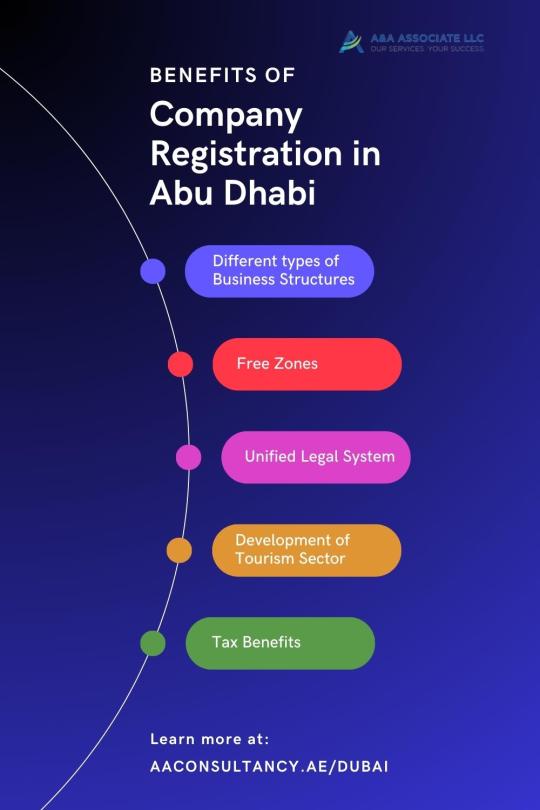
Top 5 Benefits of Company Setup in Abu Dhabi
Discussed below are the top 5 benefits of setting up a business in Abu Dhabi:
1. Different types of business structures: Company setup in Abu Dhabi offers a wide range of business structures such as the sole proprietor, limited liability company, partnership, and others that provide flexibility to entrepreneurs to choose a structure that suits their business needs.
2. Free Zones: Abu Dhabi offers multiple free zones that provide a conducive business environment for companies operating in different sectors. These free zones offer numerous benefits such as 100% foreign ownership, tax exemptions, and simplified legal procedures.
3. Unified legal system: Abu Dhabi's legal system provides a transparent and efficient legal framework for companies operating in the emirate. This helps businesses to resolve any legal disputes in a timely and cost-effective manner.
4. Development of the tourism sector: Abu Dhabi's government has initiated several measures to promote the tourism sector, such as building world-class infrastructure, developing theme parks, and promoting cultural attractions. This has resulted in the growth of the tourism industry, which has opened up new business opportunities for entrepreneurs.
5. Tax benefits: Abu Dhabi offers numerous tax benefits to businesses such as zero corporate tax, zero personal income tax, and zero VAT. This attracts foreign direct investment into the emirate and enables businesses to save significant amounts in taxes, ultimately increasing their profitability.
In conclusion, setting up a business in Abu Dhabi offers a plethora of benefits for entrepreneurs and investors alike. These benefits make it an attractive destination for businesses looking to expand their operations in the Middle East. With a stable economy, a supportive government, and a strategic location, Abu Dhabi is poised to become an even more attractive destination for businesses in the years to come.
2 notes
·
View notes
Text
Are you dreaming of owning property in the heart of the Middle East's bustling cities? 👀 Scale up your investment potential with a stunning real estate opportunity in the UAE, the land of limitless possibilities! 🏙
The UAE offers a mix of sustainability and innovation, seamlessly integrating cultural heritage into modern architecture. As international investors are increasingly attracted by the UAE's investor-friendly environment and diversified economic landscape, make sure you don't miss this golden opportunity! 💡
Explore various property options from luxurious apartments to prestigious villas in Dubai, Abu Dhabi, and beyond. Whether you prefer the breathtaking views of the Arabian Gulf or the urban charm of city life, the UAE's real estate market caters to all tastes and budgets. 🏠🌴 https://www.summerhomes.com/en/property-in-uae
I invite you to put your stamp on tomorrow and invest in the dynamic, growing UAE market that offers not just homes, but lifestyles. For detailed information, quick queries, and effective solutions, visit the link in my bio. Make the UAE your home today. 🇦🇪💼🌐
2 notes
·
View notes
Photo









27 April 2023: Queen Rania visited the Jordanian offices of Flat6Labs on Wednesday, where she spoke with a number of local entrepreneurs and startup owners about the opportunities and challenges faced by their growing businesses.
Upon her arrival at Flat6Labs’ offices at the King Hussein Business Park, Queen Rania joined General Manager Rasha Manna, Founder Hany Al Sonbaty, and other members of the firm’s management team for a conversation on its operations, services, and plans for the future.
A regional startup accelerator and seed fund management firm, Flat6Labs works directly with promising entrepreneurs as a corporate partner, helping them expand their companies and target markets across the Middle East and North Africa, Sonbaty explained.
Since it was first established in Cairo in 2011, the firm has expanded to six more locations, and plans to enter additional emerging markets in the future. (Source: Petra)
According to Manna, the firm’s Amman chapter, launched in 2021, provides early stage funding and support services to promising Jordanian businesses, with a particular focus on technology and innovation. During its first five years, Flat6Labs Jordan aims to invest in more than 90 early-stage startups in technology-driven fields such as education, healthcare, gaming, electronics, renewable energy, manufacturing, agriculture, and finance.
Manna also briefed Her Majesty on Flat6Labs’ training and support programs, which provide non-financial services to help accelerate startups’ growth. The firm connects participating entrepreneurs with a network of hundreds of business mentors, investors, and corporates, facilitating business and learning opportunities to promote their advancement.
During her visit, the Queen met with a number of entrepreneurs and startup owners who have previously benefited from Flat6Labs programs to hear about their experiences as business owners in the kingdom. She also sat in on a training session attended by the firm’s current cohort of entrepreneurs.
In addition to its Cairo and Amman chapters, Flat6Labs operates in Jeddah, Abu Dhabi, Beirut, Tunis, and Bahrain. Managing a number of seed funds valued at 85 million USD, the firm has supported more than 370 startups and 1,000 entrepreneurs across the region to date.
Flat6Labs is supported by more than 25 institutional investors across the Middle East, allowing it to provide startups with funding ranging from 50,000 USD to 500,000 USD to support them through the early stages of their businesses.
9 notes
·
View notes
Text
Pursue a Future in AI: Study in UAE’s Top Institutions
The UAE has transformed into a worldwide headquarters for artificial intelligence and data science which provides premium educational possibilities to students. If you want to Study AI and Data Science in UAE then remarkable educational programs at universities across Dubai and Abu Dhabi will help you launch your promising career in these leading-edge fields.
Why Choose AI and Data Science in UAE?
Artificial intelligence professionals find the UAE to be their ideal destination because its government provides significant investment in research and innovation. UAE universities present both diploma-style Best AI and Data Science programs Dubai along with specialized artificial intelligence education options which align with industry needs.
Top AI and Computer Science Programs in Dubai
Students interested in Undergraduate AI and Data Science courses UAE can access complete learning programs which mix theoretical education with hands-on practical training at top local universities. The programs combine training in machine learning alongside robotics and big data analytics which gives students fundamental competencies for success in their field.
Student should study AI and Computer Science degree programs.
Dubai features distinguished academic institutions that provide nationally renowned Computer Science and AI programs Dubai. These programs introduce topics that include deep learning alongside both neural networks and cloud computing. AI degree programs provide students the chance to master a field which demonstrates unprecedented industrial development.
A bachelor's program combines artificial intelligence with computer science education.
Cryptoi University in UAE offers an accredited Bachelor of Computer Science and AI UAE program which sets students on the path toward their future career. Through this program students become equipped to work across data science positions along with AI research and software engineering domains. Dubai universities provide their students with leading-edge research laboratories along with practical learning through internships.
Where to Study Computer Science and AI in Dubai?
The Study Computer Science and Artificial Intelligence Dubai program brings internationally recognized universities with specialized Artificial Intelligence academic offerings. The programs teach students to advance their problem-solving abilities and their computational thinking capabilities and their AI development skills.
BSc Computer Science and AI in UAE
Students who earn a BSc Computer Science and AI UAE degree will find multiple employment options between AI engineering positions and cybersecurity and data analytical roles. Students enrolled in Dubai universities learn artificial intelligence through education which connects theory to practical needs in artificial intelligence applications.
The Best AI and Computer Science Programs Exist in Dubai Institutions
Students who seek the Top universities for Computer Science and AI Dubai should review prestigious learning institutions which excel at both advanced research and hands-on education and employ expert faculty. Students accessing career opportunities of high quality can do so through university partnerships with international technology companies.
Final Thoughts
Data science and artificial intelligence education in the UAE has experienced significant expansion which delivers students stimulating educational experiences. Students seeking specialized training in machine learning and data analytics and AI-driven technologies will find Dubai as their ideal starting point for academic studies.
0 notes
Text
Top Free Zones in the UAE: A Quick Guide for Businesses

Free zone business setup services in the UAE are gaining wide attention among entrepreneurs and investors. Thanks to the thriving business ecosystem of free zones that offers great incentives, support, and robust infrastructure, it’s no wonder that free zones stand as one of the most sought-after business setup choices for company formation.
This popularity of free zones is particularly because of their many business benefits including full foreign ownership and tax exemptions. The UAE has around 46 free zones and given the region’s prolific growth, the number can only be expected to grow.
The concern, however, is raised when a business has to choose from one of the many free zones. While there could be n number of things one can do to find the right one, we have tried to make it a little easier for businesses by compiling a list the top free zones of the UAE.
We have also outlined some necessary factors to consider when selecting a free zone.
What is a Free Zone?
A free zone, also known as a free trade zone, is a designated area within the emirates where businesses operate with specific privileges. These zones are designed to attract foreign direct investment by offering various financial and operational benefits.
In the UAE, free zones cater to different industries, making it easy for businesses to find a suitable location based on their sector and requirements.
Benefits of Setting Up in a UAE Free Zone
100% Foreign Ownership – Free zone companies can be fully owned by foreign investors.
Tax Advantages – Most free zones offer complete exemption from corporate and personal income taxes.
Duty-Free Imports and Exports – Businesses enjoy customs duty exemptions for goods traded within the free zone.
Simplified Business Setup – Free zones provide streamlined registration and licensing processes, making it easier to start operations.
Repatriation of Profits – Investors can repatriate 100% of their profits and capital without restrictions.
Strategic Locations – Many free zones are situated near ports, airports, or major trade routes, facilitating seamless international business operations.
Top Free Zones in the UAE

1. Dubai Multi Commodities Centre (DMCC)
DMCC is one of the most renowned free zones in the UAE, known for its robust regulatory framework and world-class infrastructure. Located in Jumeirah Lakes Towers, Dubai, it caters to a wide range of industries, including commodities trading, finance, and professional services.
Key Features:
Over 20,000 registered companies
State-of-the-art office spaces
Networking opportunities with industry leaders
Access to world-class trading facilities
2. Jebel Ali Free Zone (JAFZA)
JAFZA, established in 1985, is one of the oldest and largest free zones in the UAE. It is strategically located near Jebel Ali Port, making it an ideal choice for logistics, manufacturing, and trading businesses.
Key Features:
Home to over 8,700 companies
Direct access to the region’s largest shipping port
Custom-built warehouses and industrial facilities
Exemption from import and re-export duties
3. Dubai Silicon Oasis (DSO)
For tech startups and IT businesses, Dubai Silicon Oasis is a prime destination. It is a government-owned free zone dedicated to fostering technological innovation and entrepreneurship.
Key Features:
Focus on IT, electronics, and engineering sectors
State-of-the-art business and residential facilities
In-house business incubators for startups
Excellent research and development support
4. Abu Dhabi Global Market (ADGM)
ADGM is a financial free zone that positions itself as a global finance and business hub. It operates under English common law, making it attractive to international investors.
Key Features:
World-class financial regulations
Business-friendly tax policies
A thriving financial services ecosystem
Fast-track business setup process
5. Sharjah Media City (Shams)
Shams is a popular choice for media, marketing, and creative businesses. It provides cost-effective business solutions for freelancers, startups, and media professionals.
Key Features:
100% foreign ownership
Cost-effective business setup packages
No requirement for a physical office space
Focus on media, digital marketing, and publishing industries
6. Ras Al Khaimah Economic Zone (RAKEZ)
RAKEZ is a versatile free zone that supports startups, SMEs, and large industrial enterprises. It offers customized solutions for different business activities at competitive costs.
Key Features:
Affordable licensing options
Wide range of business activities supported
Industrial and warehouse facilities available
Strategic location with easy access to UAE ports
7. Fujairah Creative City
For entrepreneurs in the media and creative industries, Fujairah Creative City offers a hassle-free setup process and a business-friendly environment.
Key Features:
Ideal for media, marketing, and consulting businesses
No requirement for a local sponsor
Simplified registration process
Low-cost office solutions
Quick Tips to Select the Right Free Zone
When selecting a free zone, consider the following factors:
- Industry Specialization – Choose a free zone that caters to your specific business sector.
- Location – Proximity to transport hubs can be crucial for logistics and trading companies.
- Cost – Compare licensing fees, office rent, and operational costs.
- Business Support – Check for networking opportunities, incubator programs, and support services.
- Regulatory Framework – Ensure the free zone’s policies align with your business goals.
Find the Right Free Zone for Your Business

UAE’s free zones is filled with opportunities for investors and entrepreneurs looking to expand their businesses in a cost-effective manner. Whether you're in finance, media, or tech, with the right approach, you can find a free zone in the UAE that caters to your business needs.
By choosing the right free zone, you can maximize benefits and position your company for long-term success in the UAE. If you're ready to set up your free zone business setup in the UAE, explore the options mentioned above and take the first step toward a profitable future.
#Business Setup Services in UAE#Business Setup Services in Dubai#Business Setup Services in Saudi Arabia#Business Setup Services in KSA#Company Formation Services in Saudi Arabia#Company Formation Services in Dubai#Company Formation Services in UAE#Company Formation Services in KSA#Company Setup Services in UAE#Company Setup Services in Dubai#Company Setup Services in KSA#Company Setup Services in Saudi Arabia#Dubai Mainland Business Setup#set up freezone company dubai#Business Setup Process in Saudi Arabia#corporate services dubai#corporate services company in dubai#corporate services in dubai uae#professional corporate services dubai#uae corporate services#Nimbus Consultancy
0 notes